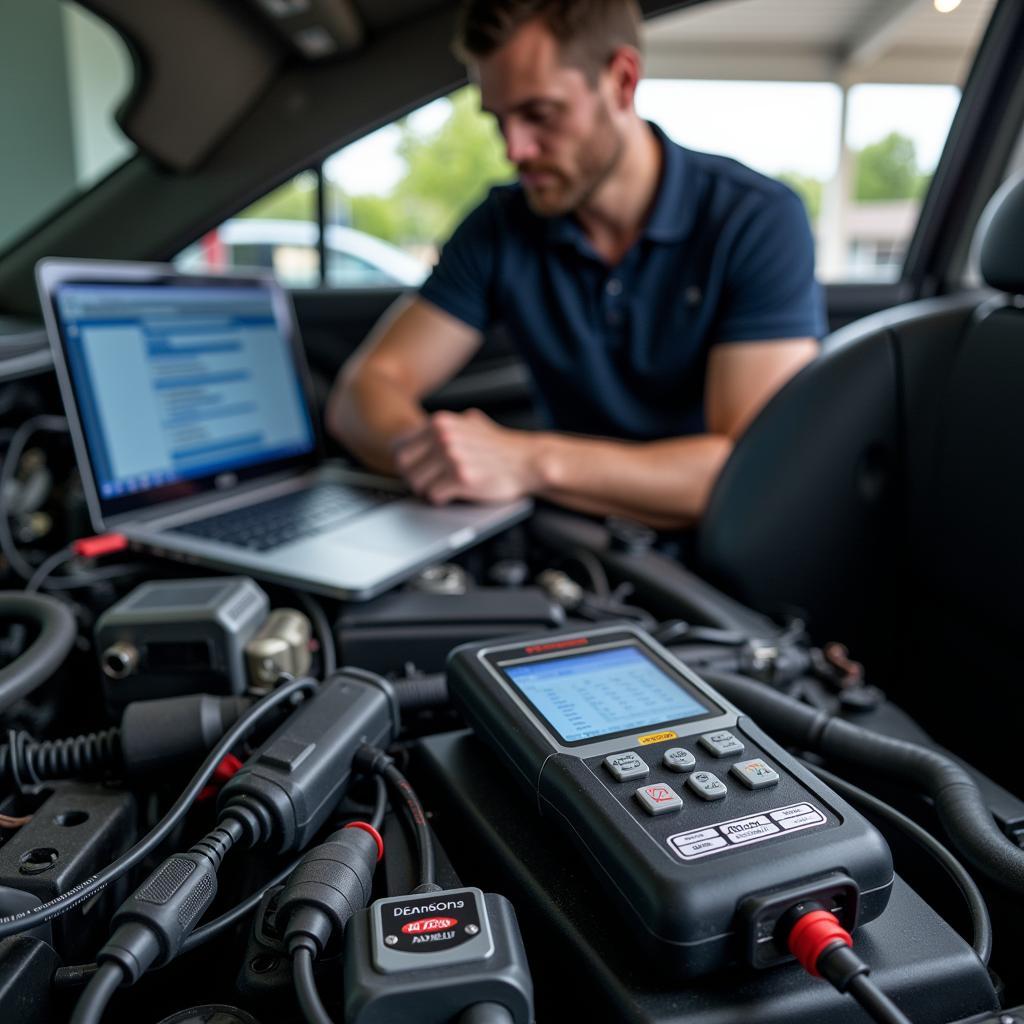The modern car is a technological marvel, but with complexity comes the potential for faults. Understanding car fault diagnostics is essential for anyone looking to launch a career as an auto technician, or even for the DIY enthusiast who wants to delve deeper into their vehicle’s inner workings. This comprehensive guide explores everything you need to know about Car Fault Diagnostics Courses, helping you make an informed decision about furthering your automotive expertise.
What is a Car Fault Diagnostics Course?
A car fault diagnostics course provides the knowledge and skills to identify and troubleshoot problems within a vehicle’s electrical and mechanical systems. These courses delve into the intricacies of:
- On-Board Diagnostics (OBD) systems: Learn to interpret those cryptic engine codes and unlock valuable insights into your car’s health.
- Using diagnostic equipment: From basic code readers to advanced scan tools, you’ll gain hands-on experience with the tools of the trade.
- Analyzing sensor data: Understand how to read and interpret data from various sensors to pinpoint the root cause of automotive issues.
- Troubleshooting methodologies: Develop systematic approaches to diagnose and resolve complex car problems efficiently.
Why Take a Car Fault Diagnostics Course?
Investing in a car fault diagnostics course offers a multitude of benefits:
- High demand career path: Skilled automotive technicians are in high demand, and specializing in diagnostics opens doors to lucrative job opportunities.
- Cost savings: Diagnose and potentially fix car problems yourself, saving money on expensive mechanic fees.
- Enhanced car knowledge: Gain a deeper understanding of how your car works, empowering you to make informed decisions about maintenance and repairs.
- Increased confidence: Confidently tackle car troubles, knowing you have the skills and knowledge to identify and address issues effectively.
 Car Diagnostic Tools in Action
Car Diagnostic Tools in Action
Types of Car Fault Diagnostics Courses
Finding the right course is crucial. Consider these popular options:
- Beginner courses: Ideal for individuals with little to no prior automotive experience, covering the basics of car mechanics and introductory diagnostics.
- Advanced courses: Geared towards experienced mechanics seeking to specialize in specific diagnostic areas like engine management, transmission, or ABS systems.
- Online courses: Provide flexibility and convenience, allowing you to learn at your own pace from anywhere in the world.
- In-person courses: Offer hands-on training in a workshop environment, allowing you to practice using diagnostic tools and equipment under the guidance of experienced instructors.
Choosing the Right Course
Selecting the best course for your needs depends on your current skill level, career aspirations, and learning preferences. Here are some factors to consider:
- Accreditation and reputation: Ensure the course is recognized by reputable automotive organizations.
- Curriculum: Thoroughly review the course outline to ensure it covers the specific diagnostic areas you’re interested in.
- Instructor experience: Learn from industry professionals with extensive practical experience in car fault diagnostics.
- Facilities and equipment: Hands-on training is crucial. Look for courses offering access to modern diagnostic tools and equipment.
Essential Skills for Car Fault Diagnostics
Successful car fault diagnosis requires a combination of technical skills and analytical thinking. Here are some essential skills you’ll develop:
- Technical proficiency: Understanding of automotive systems, including engines, transmissions, brakes, and electrical systems.
- Problem-solving: Ability to analyze symptoms, interpret data, and systematically eliminate potential causes.
- Critical thinking: Applying logic and reasoning to diagnose complex issues and develop effective solutions.
- Communication: Clearly communicate findings and solutions to clients or colleagues.
- Adaptability: The automotive industry is constantly evolving. Staying updated on the latest technologies and diagnostic techniques is essential.
The Future of Car Fault Diagnostics
With advancements in technology, the field of car fault diagnostics is rapidly evolving. Here are some key trends shaping the future:
- Increased complexity: Modern vehicles are equipped with sophisticated electronic systems, demanding even more specialized diagnostic skills.
- Data-driven diagnostics: The use of big data and predictive analytics is transforming how faults are diagnosed and even prevented.
- Remote diagnostics: Cloud-based platforms allow technicians to remotely access vehicle data and perform diagnostics without physical access to the car.
Conclusion
Embarking on a car fault diagnostics course is an investment in a rewarding and future-proof career. Whether you aspire to become a master technician or simply want to gain a deeper understanding of your own vehicle, the right course will equip you with the knowledge and skills to succeed in the dynamic world of automotive diagnostics.
FAQs
1. How long does a typical car fault diagnostics course take?
Course durations vary depending on the level and depth of instruction. Beginner courses may range from a few days to a few weeks, while more advanced programs can last several months.
2. Do I need prior automotive experience to enroll in a car fault diagnostics course?
Some courses cater specifically to beginners with little to no experience, while others require a foundation in automotive mechanics. It’s essential to review the prerequisites for each course before enrolling.
3. What types of jobs can I pursue after completing a car fault diagnostics course?
Graduates can explore careers as automotive technicians, diagnosticians, service advisors, or even start their own automotive repair businesses.
4. Are online car fault diagnostics courses as effective as in-person courses?
Both online and in-person courses have their advantages. Online courses offer flexibility and convenience, while in-person courses provide hands-on training in a workshop setting.
5. What is the average salary for a car fault diagnostics technician?
Salaries vary based on experience, location, and employer. However, skilled diagnostics technicians are in high demand and can command competitive wages.
Still have questions?
Contact us via WhatsApp: +1(641)206-8880 or Email: [email protected]. Our dedicated team is available 24/7 to assist you.

Leave a Reply